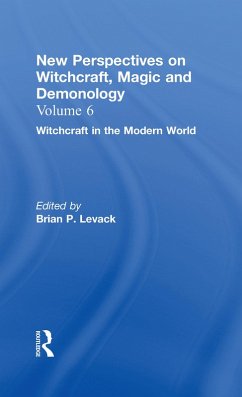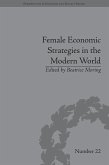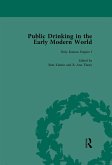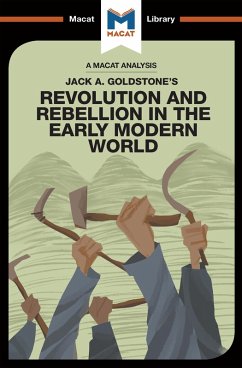Witchcraft in the Modern World (eBook, ePUB)
New Perspectives on Witchcraft, Magic, and Demonology
Redaktion: Levack, Brian P.
44,95 €
44,95 €
inkl. MwSt.
Sofort per Download lieferbar

22 °P sammeln
44,95 €
Als Download kaufen

44,95 €
inkl. MwSt.
Sofort per Download lieferbar

22 °P sammeln
Jetzt verschenken
Alle Infos zum eBook verschenken
44,95 €
inkl. MwSt.
Sofort per Download lieferbar
Alle Infos zum eBook verschenken

22 °P sammeln
Witchcraft in the Modern World (eBook, ePUB)
New Perspectives on Witchcraft, Magic, and Demonology
Redaktion: Levack, Brian P.
- Format: ePub
- Merkliste
- Auf die Merkliste
- Bewerten Bewerten
- Teilen
- Produkt teilen
- Produkterinnerung
- Produkterinnerung

Bitte loggen Sie sich zunächst in Ihr Kundenkonto ein oder registrieren Sie sich bei
bücher.de, um das eBook-Abo tolino select nutzen zu können.
Hier können Sie sich einloggen
Hier können Sie sich einloggen
Sie sind bereits eingeloggt. Klicken Sie auf 2. tolino select Abo, um fortzufahren.

Bitte loggen Sie sich zunächst in Ihr Kundenkonto ein oder registrieren Sie sich bei bücher.de, um das eBook-Abo tolino select nutzen zu können.
First published in 2002. Routledge is an imprint of Taylor & Francis, an informa company.
- Geräte: eReader
- mit Kopierschutz
- eBook Hilfe
- Größe: 15.23MB
Andere Kunden interessierten sich auch für
![Witchcraft in the British Isles and New England (eBook, ePUB) Witchcraft in the British Isles and New England (eBook, ePUB)]() Witchcraft in the British Isles and New England (eBook, ePUB)44,95 €
Witchcraft in the British Isles and New England (eBook, ePUB)44,95 €![War In The Early Modern World (eBook, ePUB) War In The Early Modern World (eBook, ePUB)]() War In The Early Modern World (eBook, ePUB)39,95 €
War In The Early Modern World (eBook, ePUB)39,95 €![Great Britain, the Dominions and the Transformation of the British Empire, 1907-1931 (eBook, ePUB) Great Britain, the Dominions and the Transformation of the British Empire, 1907-1931 (eBook, ePUB)]() Jaroslav ValkounGreat Britain, the Dominions and the Transformation of the British Empire, 1907-1931 (eBook, ePUB)44,95 €
Jaroslav ValkounGreat Britain, the Dominions and the Transformation of the British Empire, 1907-1931 (eBook, ePUB)44,95 €![Female Economic Strategies in the Modern World (eBook, ePUB) Female Economic Strategies in the Modern World (eBook, ePUB)]() Female Economic Strategies in the Modern World (eBook, ePUB)25,95 €
Female Economic Strategies in the Modern World (eBook, ePUB)25,95 €![Public Drinking in the Early Modern World Vol 2 (eBook, ePUB) Public Drinking in the Early Modern World Vol 2 (eBook, ePUB)]() Thomas E BrennanPublic Drinking in the Early Modern World Vol 2 (eBook, ePUB)54,95 €
Thomas E BrennanPublic Drinking in the Early Modern World Vol 2 (eBook, ePUB)54,95 €![An Analysis of Jack A. Goldstone's Revolution and Rebellion in the Early Modern World (eBook, ePUB) An Analysis of Jack A. Goldstone's Revolution and Rebellion in the Early Modern World (eBook, ePUB)]() Etienne StocklandAn Analysis of Jack A. Goldstone's Revolution and Rebellion in the Early Modern World (eBook, ePUB)6,99 €
Etienne StocklandAn Analysis of Jack A. Goldstone's Revolution and Rebellion in the Early Modern World (eBook, ePUB)6,99 €![Settler Colonialism in the Twentieth Century (eBook, ePUB) Settler Colonialism in the Twentieth Century (eBook, ePUB)]() Settler Colonialism in the Twentieth Century (eBook, ePUB)39,95 €
Settler Colonialism in the Twentieth Century (eBook, ePUB)39,95 €-
-
-
First published in 2002. Routledge is an imprint of Taylor & Francis, an informa company.
Dieser Download kann aus rechtlichen Gründen nur mit Rechnungsadresse in A, B, BG, CY, CZ, D, DK, EW, E, FIN, F, GR, HR, H, IRL, I, LT, L, LR, M, NL, PL, P, R, S, SLO, SK ausgeliefert werden.
Produktdetails
- Produktdetails
- Verlag: Taylor & Francis eBooks
- Seitenzahl: 350
- Erscheinungstermin: 28. Oktober 2013
- Englisch
- ISBN-13: 9781136538278
- Artikelnr.: 47895842
- Verlag: Taylor & Francis eBooks
- Seitenzahl: 350
- Erscheinungstermin: 28. Oktober 2013
- Englisch
- ISBN-13: 9781136538278
- Artikelnr.: 47895842
- Herstellerkennzeichnung Die Herstellerinformationen sind derzeit nicht verfügbar.
Brian P. Levack is John Green Regents Professor of History at the University of Texas at Austin. A former Guggenheim Fellow, his other writings on witchcraft include Articleson Witchcraft, Magic, and Demonology (1992), TheWitch-Hunt in Early Modern Europe (1995), and Witchcraftand Magic in Europe: The Eighteenth and NineteenthCenturies (1999). Dr. Levack is also a specialist in the history of early modern England and Scotland, and has written several books on the subject.
Walinski-Kiehl. Robert S. Godly States: Confessional Conflict and Witch-Hunting in Early Modern Germany. Mentalité-Mentalities 5 (1988). Gijswijt-Hofstra
Marijke. Witchcraft in the Northern Netherlands. In Arina Angerman
et al eds.
Current Issues in Women's History (London
UK: Routledge
1989). Gijswijt-Hofstra
Marijke. The European Witchcraft Debate and the Dutch Variant. Social History 15 (1990). Behringer
Wolfgang. Weather
Hunger and Fear: The Origins of the European Witch Prosecutions in Climate
Society and Mentality. German History 13 (1995). Golden
Richard M. Satan in Europe: The Geography of the Witch Hunts. In Michael Wolfe
ed.
Changing Identities in Early Modern France (Durham
NC: Duke University Press
1997). Nenonen
M. Envious are all the People
Witches Watch at Every Gate: Finnish Witches and Witch Trials in the Seventeenth Century. Scandinavian Journal of History 18 (1993). Deutscher
Thomas. The Role of the Episcopal Tribunal of Novara in the Suppression of Heresy and Witchcraft
1563-1615. The Catholic Historical Review 77 (1991). Borst
Arno. The Origins of the Witch-Craze in the Alps. In Medieval Worlds: Barbarians
Heretics and Artists in the Middle Ages
(Cambridge
UK: 1991). Klaniczay
Gábor. Witch-Hunting in Hungary: Social or Cultural Tensions? Acta Ethnographica Hungarica 37 (1991-2). Klaniczay
Gábor and Pocs
Eva. Witch Beliefs and Witch Hunting in Central and Eastern Europe. Acta Ethnographica Hungarica 37 (1991-2). Haliczer
Stephen. The Jew as Witch: Displaced Aggression and the Myth of the Santo Niño de La Guardia. In Mary Elizabeth Perry and Anne J. Cruz
eds.
Cultural Encounters: The Impact of the Inquisition in Spain and the New World(Los Angeles
CA: University of California Press
1991). Lyndal
Roper. Evil Imaginings and Fantasies: Child Witches and the End of the Witch-Craze. Past & Present 167 (2000). Ellison
R.C. The Kirkjuból Affair: A Seventeenth-Century Icelandic Witchcraft Case Analyzed. The Seventeenth Century 8 (1993). Lehmann
Hartmut. The Persecution of Witches as Restoration of Order: The Case of Germany
1590s-1650s. Central European History 21 (1988). Levack
Brian P. State-Building and Witch Hunting in Early Modern Europe. In J. Barry
et al
eds.
Witchcraft in Early Modern Europe (Cambridge
UK: 1996). Hall
Thor and Burhenn
Herbert W.L. The Making of a Witch: The Guilty Triangle--As Illustrated in the Case Against Elline Klokkers of Gjerpen. Scandinavian Studies 60 (1988). Walinski-Kiehl
Robert. The Devil's Children: Child Witch-Trials in Early Modern Germany. Continuity and Change 11 (1996). Behar
Ruth. The Visions of a Guachichil Witch in 1599: A Window on the Subjugation of Mexico's Hunter-Gatherers. Ethnohistory 34 (1987). Sharpe
J.A. Witches and Persecuting Societies. Journal of Historical Sociology 3 (1990). Smith
Philip. A Quantitative Evaluation of Demographic
Gender and Social Transformation Theories of the Rise of European Witch Hunting. Historical Social Research 17 (1992). Kristóf
Ildikó. Wise Women
Sinners and the Poor: the Social Background in a 16th-18th-Century Calvinist City of Eastern Hungary. Acta Ethnographica Hungarica 37 (1991-2). Vukanovi
T.P.
Witchcraft in the Central Balkans I: Characteristics of Witches. Folklore 100 (1989). Cassar
Carmel. Witchcraft Beliefs and Social Control in Seventeenth-Century Malta. Journal of Mediterranean Studies 3 (1993).
Marijke. Witchcraft in the Northern Netherlands. In Arina Angerman
et al eds.
Current Issues in Women's History (London
UK: Routledge
1989). Gijswijt-Hofstra
Marijke. The European Witchcraft Debate and the Dutch Variant. Social History 15 (1990). Behringer
Wolfgang. Weather
Hunger and Fear: The Origins of the European Witch Prosecutions in Climate
Society and Mentality. German History 13 (1995). Golden
Richard M. Satan in Europe: The Geography of the Witch Hunts. In Michael Wolfe
ed.
Changing Identities in Early Modern France (Durham
NC: Duke University Press
1997). Nenonen
M. Envious are all the People
Witches Watch at Every Gate: Finnish Witches and Witch Trials in the Seventeenth Century. Scandinavian Journal of History 18 (1993). Deutscher
Thomas. The Role of the Episcopal Tribunal of Novara in the Suppression of Heresy and Witchcraft
1563-1615. The Catholic Historical Review 77 (1991). Borst
Arno. The Origins of the Witch-Craze in the Alps. In Medieval Worlds: Barbarians
Heretics and Artists in the Middle Ages
(Cambridge
UK: 1991). Klaniczay
Gábor. Witch-Hunting in Hungary: Social or Cultural Tensions? Acta Ethnographica Hungarica 37 (1991-2). Klaniczay
Gábor and Pocs
Eva. Witch Beliefs and Witch Hunting in Central and Eastern Europe. Acta Ethnographica Hungarica 37 (1991-2). Haliczer
Stephen. The Jew as Witch: Displaced Aggression and the Myth of the Santo Niño de La Guardia. In Mary Elizabeth Perry and Anne J. Cruz
eds.
Cultural Encounters: The Impact of the Inquisition in Spain and the New World(Los Angeles
CA: University of California Press
1991). Lyndal
Roper. Evil Imaginings and Fantasies: Child Witches and the End of the Witch-Craze. Past & Present 167 (2000). Ellison
R.C. The Kirkjuból Affair: A Seventeenth-Century Icelandic Witchcraft Case Analyzed. The Seventeenth Century 8 (1993). Lehmann
Hartmut. The Persecution of Witches as Restoration of Order: The Case of Germany
1590s-1650s. Central European History 21 (1988). Levack
Brian P. State-Building and Witch Hunting in Early Modern Europe. In J. Barry
et al
eds.
Witchcraft in Early Modern Europe (Cambridge
UK: 1996). Hall
Thor and Burhenn
Herbert W.L. The Making of a Witch: The Guilty Triangle--As Illustrated in the Case Against Elline Klokkers of Gjerpen. Scandinavian Studies 60 (1988). Walinski-Kiehl
Robert. The Devil's Children: Child Witch-Trials in Early Modern Germany. Continuity and Change 11 (1996). Behar
Ruth. The Visions of a Guachichil Witch in 1599: A Window on the Subjugation of Mexico's Hunter-Gatherers. Ethnohistory 34 (1987). Sharpe
J.A. Witches and Persecuting Societies. Journal of Historical Sociology 3 (1990). Smith
Philip. A Quantitative Evaluation of Demographic
Gender and Social Transformation Theories of the Rise of European Witch Hunting. Historical Social Research 17 (1992). Kristóf
Ildikó. Wise Women
Sinners and the Poor: the Social Background in a 16th-18th-Century Calvinist City of Eastern Hungary. Acta Ethnographica Hungarica 37 (1991-2). Vukanovi
T.P.
Witchcraft in the Central Balkans I: Characteristics of Witches. Folklore 100 (1989). Cassar
Carmel. Witchcraft Beliefs and Social Control in Seventeenth-Century Malta. Journal of Mediterranean Studies 3 (1993).
Walinski-Kiehl. Robert S. Godly States: Confessional Conflict and Witch-Hunting in Early Modern Germany. Mentalité-Mentalities 5 (1988). Gijswijt-Hofstra
Marijke. Witchcraft in the Northern Netherlands. In Arina Angerman
et al eds.
Current Issues in Women's History (London
UK: Routledge
1989). Gijswijt-Hofstra
Marijke. The European Witchcraft Debate and the Dutch Variant. Social History 15 (1990). Behringer
Wolfgang. Weather
Hunger and Fear: The Origins of the European Witch Prosecutions in Climate
Society and Mentality. German History 13 (1995). Golden
Richard M. Satan in Europe: The Geography of the Witch Hunts. In Michael Wolfe
ed.
Changing Identities in Early Modern France (Durham
NC: Duke University Press
1997). Nenonen
M. Envious are all the People
Witches Watch at Every Gate: Finnish Witches and Witch Trials in the Seventeenth Century. Scandinavian Journal of History 18 (1993). Deutscher
Thomas. The Role of the Episcopal Tribunal of Novara in the Suppression of Heresy and Witchcraft
1563-1615. The Catholic Historical Review 77 (1991). Borst
Arno. The Origins of the Witch-Craze in the Alps. In Medieval Worlds: Barbarians
Heretics and Artists in the Middle Ages
(Cambridge
UK: 1991). Klaniczay
Gábor. Witch-Hunting in Hungary: Social or Cultural Tensions? Acta Ethnographica Hungarica 37 (1991-2). Klaniczay
Gábor and Pocs
Eva. Witch Beliefs and Witch Hunting in Central and Eastern Europe. Acta Ethnographica Hungarica 37 (1991-2). Haliczer
Stephen. The Jew as Witch: Displaced Aggression and the Myth of the Santo Niño de La Guardia. In Mary Elizabeth Perry and Anne J. Cruz
eds.
Cultural Encounters: The Impact of the Inquisition in Spain and the New World(Los Angeles
CA: University of California Press
1991). Lyndal
Roper. Evil Imaginings and Fantasies: Child Witches and the End of the Witch-Craze. Past & Present 167 (2000). Ellison
R.C. The Kirkjuból Affair: A Seventeenth-Century Icelandic Witchcraft Case Analyzed. The Seventeenth Century 8 (1993). Lehmann
Hartmut. The Persecution of Witches as Restoration of Order: The Case of Germany
1590s-1650s. Central European History 21 (1988). Levack
Brian P. State-Building and Witch Hunting in Early Modern Europe. In J. Barry
et al
eds.
Witchcraft in Early Modern Europe (Cambridge
UK: 1996). Hall
Thor and Burhenn
Herbert W.L. The Making of a Witch: The Guilty Triangle--As Illustrated in the Case Against Elline Klokkers of Gjerpen. Scandinavian Studies 60 (1988). Walinski-Kiehl
Robert. The Devil's Children: Child Witch-Trials in Early Modern Germany. Continuity and Change 11 (1996). Behar
Ruth. The Visions of a Guachichil Witch in 1599: A Window on the Subjugation of Mexico's Hunter-Gatherers. Ethnohistory 34 (1987). Sharpe
J.A. Witches and Persecuting Societies. Journal of Historical Sociology 3 (1990). Smith
Philip. A Quantitative Evaluation of Demographic
Gender and Social Transformation Theories of the Rise of European Witch Hunting. Historical Social Research 17 (1992). Kristóf
Ildikó. Wise Women
Sinners and the Poor: the Social Background in a 16th-18th-Century Calvinist City of Eastern Hungary. Acta Ethnographica Hungarica 37 (1991-2). Vukanovi
T.P.
Witchcraft in the Central Balkans I: Characteristics of Witches. Folklore 100 (1989). Cassar
Carmel. Witchcraft Beliefs and Social Control in Seventeenth-Century Malta. Journal of Mediterranean Studies 3 (1993).
Marijke. Witchcraft in the Northern Netherlands. In Arina Angerman
et al eds.
Current Issues in Women's History (London
UK: Routledge
1989). Gijswijt-Hofstra
Marijke. The European Witchcraft Debate and the Dutch Variant. Social History 15 (1990). Behringer
Wolfgang. Weather
Hunger and Fear: The Origins of the European Witch Prosecutions in Climate
Society and Mentality. German History 13 (1995). Golden
Richard M. Satan in Europe: The Geography of the Witch Hunts. In Michael Wolfe
ed.
Changing Identities in Early Modern France (Durham
NC: Duke University Press
1997). Nenonen
M. Envious are all the People
Witches Watch at Every Gate: Finnish Witches and Witch Trials in the Seventeenth Century. Scandinavian Journal of History 18 (1993). Deutscher
Thomas. The Role of the Episcopal Tribunal of Novara in the Suppression of Heresy and Witchcraft
1563-1615. The Catholic Historical Review 77 (1991). Borst
Arno. The Origins of the Witch-Craze in the Alps. In Medieval Worlds: Barbarians
Heretics and Artists in the Middle Ages
(Cambridge
UK: 1991). Klaniczay
Gábor. Witch-Hunting in Hungary: Social or Cultural Tensions? Acta Ethnographica Hungarica 37 (1991-2). Klaniczay
Gábor and Pocs
Eva. Witch Beliefs and Witch Hunting in Central and Eastern Europe. Acta Ethnographica Hungarica 37 (1991-2). Haliczer
Stephen. The Jew as Witch: Displaced Aggression and the Myth of the Santo Niño de La Guardia. In Mary Elizabeth Perry and Anne J. Cruz
eds.
Cultural Encounters: The Impact of the Inquisition in Spain and the New World(Los Angeles
CA: University of California Press
1991). Lyndal
Roper. Evil Imaginings and Fantasies: Child Witches and the End of the Witch-Craze. Past & Present 167 (2000). Ellison
R.C. The Kirkjuból Affair: A Seventeenth-Century Icelandic Witchcraft Case Analyzed. The Seventeenth Century 8 (1993). Lehmann
Hartmut. The Persecution of Witches as Restoration of Order: The Case of Germany
1590s-1650s. Central European History 21 (1988). Levack
Brian P. State-Building and Witch Hunting in Early Modern Europe. In J. Barry
et al
eds.
Witchcraft in Early Modern Europe (Cambridge
UK: 1996). Hall
Thor and Burhenn
Herbert W.L. The Making of a Witch: The Guilty Triangle--As Illustrated in the Case Against Elline Klokkers of Gjerpen. Scandinavian Studies 60 (1988). Walinski-Kiehl
Robert. The Devil's Children: Child Witch-Trials in Early Modern Germany. Continuity and Change 11 (1996). Behar
Ruth. The Visions of a Guachichil Witch in 1599: A Window on the Subjugation of Mexico's Hunter-Gatherers. Ethnohistory 34 (1987). Sharpe
J.A. Witches and Persecuting Societies. Journal of Historical Sociology 3 (1990). Smith
Philip. A Quantitative Evaluation of Demographic
Gender and Social Transformation Theories of the Rise of European Witch Hunting. Historical Social Research 17 (1992). Kristóf
Ildikó. Wise Women
Sinners and the Poor: the Social Background in a 16th-18th-Century Calvinist City of Eastern Hungary. Acta Ethnographica Hungarica 37 (1991-2). Vukanovi
T.P.
Witchcraft in the Central Balkans I: Characteristics of Witches. Folklore 100 (1989). Cassar
Carmel. Witchcraft Beliefs and Social Control in Seventeenth-Century Malta. Journal of Mediterranean Studies 3 (1993).







